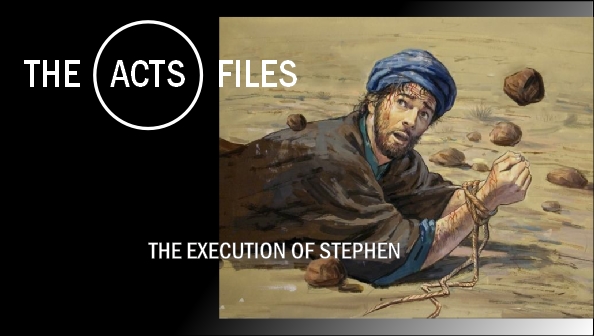By Tyson Thorne

We last left Stephen about to give his defense in Acts chapter 7, but instead of a legal defense he gave a defense of his faith. It’s unclear if Stephen knew he had been trapped by the traditional Jewish leadership, either way you have to admire his priorities. Instead of trying to get off the hook he instead takes the opportunity to tell the establishment just where they have gone wrong and challenged them to accept Jesus as their Messiah. He threw all caution to the wind and made Jesus the center of his speech, just as he did with his life.
“Provocative” doesn’t even begin to describe Stephen’s speech. He informed the Temple rulers they were unworthy of salvation because of the way they treated the prophets of old (Joseph, Moses, Elijah, Jeremiah and many others) and most recently the Savior Jesus Himself. He ridiculed the fact they worshiped God in the temple but not in their hearts; after all, “God does not live in houses made by men” (7.48). He concluded his message by calling them traitorous murderers. Shortly after his speech, the Jewish leadership proved him right and executed him by stoning.
Forgive me for detailing a practice you might already understand, but a friend of mine once revealed his Biblical illiteracy when he told me that he thought the practice of “stoning” was forcing someone to get so high on drugs that they died. That is not stoning. Instead, stoning is a form of execution where a crowd of people throw stones at the accused until they succumb to their injuries and die. It is torturous and cruel, yet from a legal standpoint it has the advantage that no one knows just whose stone struck the deathblow. Stoning is still legally practiced in Afghanistan, Indonesia, Iraq, Mauritania, Nigeria, Pakistan, Saudi Arabia, Somalia, Sudan and Yemen.
The Bible does not give details about the practice of stoning. Traditionally, however, the condemned is secured in some way, either to a pole or buried – up to the waist in the case of men and up to the chest for women. Once immobilized the crowd gathers jagged rocks and throw them as hard and fast as they are capable at the accused.
Some have argued that the execution was illegal because the Roman’s didn’t extend to the Jews the right of Capital Punishment. This is only partly true. A Roman citizen was required to have a Roman trial and, if found guilty, a Roman execution. Also, if the perpetrator was accused of breaking a Roman law it was guaranteed the Romans would be in charge of prosecution. The Roman’s did, however, extend the right to the Jews to discipline their own people in matters of Jewish faith and law. There is no indication one way or the other about Stephen’s citizenship, therefore as long as he was not a Roman the trial and execution was legal.
On that day, we are told in chapter eight, a great persecution broke out against the church. The Jews followed their leaders’ example, and began to excommunicate, and sometime execute, their Christian relatives. But the story does not end on this bleak note. Godly men buried Stephen, and the other apostles continued to preach boldly and in great power the message of the resurrected Messiah. Israel would never be the same. And neither are we the same since Christ entered our lives.
|
|
|